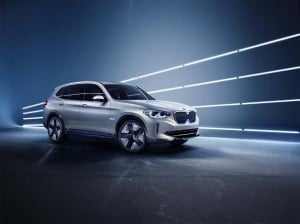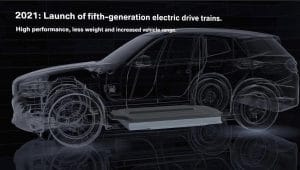We’ll be seeing a flood of new battery-electric vehicles during the next 12 months and BMW is the latest to offer some insight into what it has coming when it launches production of its first long-range battery-electric vehicle, the iX3, sometime next year.
Carrying over on the 2018 Concept iX3, the all-electric SUV will use a 74 kilowatt-hour battery to deliver an estimated 440 kilometers, or 273 miles, per charge. That’s using the European WLTP test cycle, however, which means we’ll likely see less range when the new offering reaches U.S. showrooms.
The iX3 won’t simply take BMW’s existing battery drive system and stuff it into an SUV, the automaker stresses. “The first purely electric Sports Activity Vehicle is the trailblazer for BMW eDrive technology of the fifth generation, which, starting 2021, will also be deployed in the BMW i4 and the BMW iNEXT,” it said in a statement.
(BMW unplugs range-extending i3Rex)
The Bavarian automaker was an early proponent of electrification, launching BMW i, the first sub-brand devoted specifically to battery-based vehicles. (Mercedes has followed with its electric EQ line, as has Audi with e-tron and Volkswagen with its ID models.) But after launching the original, short-range BEV, the i3, and the plug-in i8 sports car, BMW has been slow with any follow-up. Audi already has its e-tron SUV on sale, as does Jaguar with its I-Pace utility vehicle.
One reason for the slow expansion of the BMW i line-up has been the German company’s decision to rethink how it wants to handle electrification.
While it will continue to produce at least one skateboard-like platform for some models, like the iNEXT, it has decided to go with a more flexible approach for most of the rest of its line-up, developing a platform that will be able to handle everything from conventional, gas and diesel power to hybrids, plug-ins and pure electric drive.
The iX3 will be the first BMW available using this broad range of powertrain alternatives.
The size of the battery pack for the iX3 is relatively modest, at just 74 kWh. It’s bigger than the 57 kilowatt-hours offered by the Chevrolet Bolt EV but the Audi e-tron has a 95 kWh pack – and only gets an EPA rating of just over 200 miles per charge. Range is a difficult figure to predict as a variety of factors determines the final number.
Among other things, that can depend upon how much of the charge an automaker actually taps. Manufacturers vary in that strategy, in large part, based on how careful they want to be about preserving battery life. Overall vehicle efficiency is also a critical issue. What’s clear is that the U.S. version of the iX3, if it sticks with the 74 kWh pack, will get less than the European WLTP rating, perhaps as little as 225 miles if the experience with other BEVs holds true here.
(All BMW models to be electric by 2030)
One of the surprises in today’s news release is the fact that the BMW SUV will utilize just a single electric motor driving the rear wheels. BMW has noted that its future electric models will be capable of using single motors on either axle or twin motors creating a through-the-road all-wheel-drive system. It is quite possible an AWD version could follow.
For now, that rear-mounted motor will stream out 210 kilowatts, or 286 horsepower, and 295 pound-feet of torque. Because that torque will come on all but instantaneously, launch should be quite peppy, the automaker terming it, “high initial acceleration.”
It’s also unclear if a larger battery pack might be offered later, a strategy that Tesla pioneered, with other automakers, including Volkswagen, Ford and General Motors, expected to pick up on going forward.
Significantly, the new iX3 will be built at the BMW Brilliance Automotive plant in Shenyang, China operated as part of a joint venture with local partner Brilliance Automotive. It’s unclear if production will be added at any of the automakers North American or European plants later. The first BMW iX3 is expected to roll off the line sometime in 2020, the automaker not yet confirming the precise date.
Pricing is another uncertainty. The U.S. version of the Audi e-tron, with its larger battery pack, starts at $74,800.
BMW might offer a surprise on its Munroney sticker when the iX3 comes to the States. In its statement, it noted that it has been able to reduce by two-thirds the amount of cobalt in its lithium-ion batteries and that it has also been purchasing cobalt and lithium directly and then transferring the metals to its battery supplier.
(BMW launches BEV production at German plant)
We’ll likely have to wait until closer to the on-sale date of the BMW iX3 to find out more about U.S. pricing.



